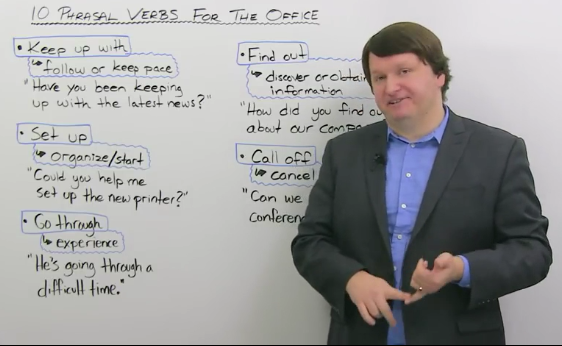Okay, next: 'keep up with'. So, 'to keep up with something' means to follow or to keep pace with something in the context of business, office work.
好了。来看下一个。‘跟上’。在商务场合中,‘跟上某事’指的是跟上、追随某事物。
Let me give you one example. 'Have you been keeping up with the latest news? Have you been following the latest news?'
举例:‘你追最近的新闻了么?你看最近的新闻了么?’
You can also talk about a business keeping up with trends, with things that are happening in their line of business now. Okay?
你可以用此谈论商业界内的趋势。
Next: 'set up'. So, 'to set something up' means to organize it or to, you know, get it started.
下一个:‘建立’。‘建立某事’指的是组织或开始某事。
So, for example: 'Could you help me set up the new printer? Could you help me plug it in and make sure everything is okay, make sure the software is on the computer? And could you help me set it up?'
举例:‘你能帮我装一下新打印机么?你能帮我插上插头,确保一切正常好么,确保电脑里有这个软件好么?以及你能帮我组装一下么?’
It's not only for objects. You can set up a meeting or organize a meeting. You can set up a holiday party, for example.
不仅能与物品连用。你可以开始或组织一场会议。你可以开个假日聚会。
Next: 'go through'. So, if you go through something, this simply means you experienced it and usually it's something difficult that you had to survive.
下一个:‘经历’。如果你经历某事,意味着你体验过过,通常指的是需要熬过来的困难的事情。
So: 'He's going through a difficult time'. Think of you're going through, like you're experiencing something that is difficult and challenging. Okay?
比如:‘他正在经受困难时期’。想象你正在经历非常困难且具有挑战性的事情。
Next: 'find out'. So, 'to find out' means to discover, or to obtain or get information. So, for example: 'How did you find out about our company?'
下一个:‘发现’。这就相当于发觉或获得、得到信息。举例:‘你是怎么知道我们公司的?’
This is a very common question that you will see on company websites.
这是一个非常普遍的问题,你会浏览公司的网页。
It's also something that you might be asked at an interview: 'How did you find out about our company? How did you discover the information about our company?' All right?
在面试中也很能被问到:‘你是怎么了解到我们公司的?你是怎么找到公司信息的?’
And finally: 'to call off'. 'Call off' means to cancel. Usually this is in the context of a meeting. So, for example: 'Can we call off the conference call?'
最后一个:‘取消’。这相当于‘cancel’。通常会在会议情景中使用。例如,‘我们能取消电话会议么?’
I just realized I didn't put a question mark and I didn't close my quotation marks, here. Just give me a sec, guys. Preparation is everything. Right?
我才发现我没写问号,漏掉了引号。稍等。准备即一切,对么?

That's what happens when I have people calling me all day.
通常有人一直打给我的时候才会这样。
Okay, so 'call off'. So you can call off a meeting, you can call off a conference call, for example.
好了,‘取消’。你可以取消会议,取消电话会议。
For example: 'Can we call off (cancel) the conference call? I'm not ready, or something important has come up'.
例如:‘我们可以取消电话会议么?我还没准备好,或者我这里有重要情况发生’。
All right, so today we looked at 10 very important, very common phrasal verbs that you can use at your office, at your job, at work.
那么今天我们讲到了在办公室工作中非常重要的10个常用动词短语。
If you want to test your understanding of these phrasal verbs, as always, you can check out the quiz on www.engvid.com.
如果你想做下相关测试,你可以登入我们网站www.engvid.com
And if you enjoyed the video, if you like what I do here, don't forget to subscribe to the channel, like my Facebook fan page, check me out on Twitter, and that's basically it.
如果你喜欢这个视频,喜欢我的课程,不要忘记订阅这个频道,关注我的Facebook、Twitter,基本上就这些了。
I mean, that's what we do, engVid, YouTube, Facebook, Twitter. That's it so far.
我是说,你们可以在engVid, YouTube, Facebook, Twitter上关注我们。扯得有点远了。
I'm thinking about Instagram, but I don't think my photos are that interesting, so forget it.
我还在想你们可以关注我的Instagram,但是我的照片好像没那么有趣,还是算了吧。
All right, so til next time guys, thanks for clicking and... Oh, one second.
我们下期见,谢谢收看...稍等。
Hello? Oh, yeah, okay. No, we can set something up for next week.
你好?是的,好的。不行。下周我们有事。
Okay. Yeah, no. I don't care what you're going through. We'll just set it up. Okay? Just... Just do it.
好的。不行。我不关系你发生了什么事。我们可以组建好么?就这么做吧。


